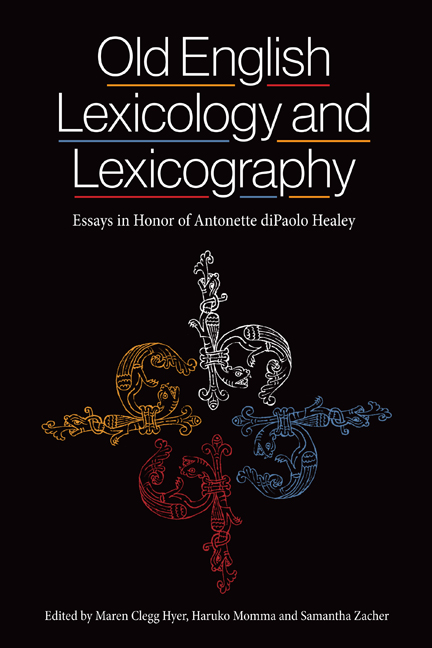Book contents
- Frontmatter
- Dedication
- Contents
- List of Illustrations
- List of Contributors
- Acknowledgements
- Abbreviations
- Introduction
- I Old English Poets and their Word-Craft
- 1 Beowulf and the Art of Invention
- 2 Juliana 53a Revisited (hætsð hæþenweoh)
- 3 Wounds and Compensation in the Old English Soul and Body Poems
- II Old English Homiletic Tradition
- 4 Defining and Redefining: Ælfric's Access to Gregory's Homiliae in Evangelia in the Composition of the Catholic Homilies
- 5 Lambeth Homily 4 and the Textual Tradition of the Visio Pauli
- 6 ‘A Vision of Souls’: Charity, Judgment, and the Utility of the Old English Vision of St. Paul
- 7 The Vocabulary of Sin and the Eight Cardinal Sins
- III Anglo-Saxon Institutions
- 8 The King (and Queen) and ‘I’: Self-Construction in Some Anglo-Saxon Royal Documents
- 9 Anglo-Saxon Maccabees: Political Theology in Ælfric's Lives of Saints
- 10 Nunne in Early Old English: Misogyny in its Literary Context
- IV Lexis of the Quotidian
- 11 Cingulum est custodiam: Semiotics and the Semantic Range of gyrdels
- 12 Island Time: The English Day and the Christian Hours
- 13 ‘Revising Hell’: The Voices of Teachers in Anglo-Saxon Studies and Anglo-Saxon England
- V The Task of the Lexicographer
- 14 Cryptography and the Lexicographer: Codifying the Code
- 15 Genre and the Dictionary of Old English
- Epilogue: Word-Hord
- 16 Reading Beowulf with Isidore's Etymologies
- An Old English Lexicon Dedicated to Toni Healey
- Toni Healey: A Tribute
- List of publications of Antonette diPaolo Healey
- Index
- Tabula Gratulatoria
- Miscellaneous Endmatter
- Anglo-Saxon Studies
7 - The Vocabulary of Sin and the Eight Cardinal Sins
Published online by Cambridge University Press: 17 September 2020
- Frontmatter
- Dedication
- Contents
- List of Illustrations
- List of Contributors
- Acknowledgements
- Abbreviations
- Introduction
- I Old English Poets and their Word-Craft
- 1 Beowulf and the Art of Invention
- 2 Juliana 53a Revisited (hætsð hæþenweoh)
- 3 Wounds and Compensation in the Old English Soul and Body Poems
- II Old English Homiletic Tradition
- 4 Defining and Redefining: Ælfric's Access to Gregory's Homiliae in Evangelia in the Composition of the Catholic Homilies
- 5 Lambeth Homily 4 and the Textual Tradition of the Visio Pauli
- 6 ‘A Vision of Souls’: Charity, Judgment, and the Utility of the Old English Vision of St. Paul
- 7 The Vocabulary of Sin and the Eight Cardinal Sins
- III Anglo-Saxon Institutions
- 8 The King (and Queen) and ‘I’: Self-Construction in Some Anglo-Saxon Royal Documents
- 9 Anglo-Saxon Maccabees: Political Theology in Ælfric's Lives of Saints
- 10 Nunne in Early Old English: Misogyny in its Literary Context
- IV Lexis of the Quotidian
- 11 Cingulum est custodiam: Semiotics and the Semantic Range of gyrdels
- 12 Island Time: The English Day and the Christian Hours
- 13 ‘Revising Hell’: The Voices of Teachers in Anglo-Saxon Studies and Anglo-Saxon England
- V The Task of the Lexicographer
- 14 Cryptography and the Lexicographer: Codifying the Code
- 15 Genre and the Dictionary of Old English
- Epilogue: Word-Hord
- 16 Reading Beowulf with Isidore's Etymologies
- An Old English Lexicon Dedicated to Toni Healey
- Toni Healey: A Tribute
- List of publications of Antonette diPaolo Healey
- Index
- Tabula Gratulatoria
- Miscellaneous Endmatter
- Anglo-Saxon Studies
Summary
In his classic treatment of the deadly sins Morton W. Bloomfield considers a range of ideas and works from the somewhat problematical origins of the theme in the late patristic period through the high Middle Ages. More to the purpose here, he offers in effect a catalog of Old English works notably by Ælfric, Wulfstan, and the anonymous tradition, showing the development of the theme. I hope to update Bloomfield's work in at least one area, namely the treatment of the eight cardinal sins, and to extend the discussion further as a study of the vocabulary of sin. Let me note at the outset that I try to hold fast to a distinction between ‘cardinal sins’, i.e. those that are a part of a schema organizing sinful behavior and describing it, and those that are ‘deadly’ to the soul. Over time, the distinction weakens as moralists describe sinfulness or seek to expand the concept. The list of eight is therefore sometimes called ‘cardinal’ or sometimes ‘principal’ sins. The major focus here will be on five texts: Alcuin's Liber de uirtutibus et uitiis; Vercelli Homily 20 (untitled and unattributed); Ælfric's Sermo de memoria (Lives of Saints); his Dominica in Media Quadragesime (Catholic Homilies II, 12); and Cambridge, Pembroke College, MS 25, Art. 93, fols 173–75 (cap. 27–35), Predicatio bona de octo uitiis idemque uirtutibus (unattributed). This select quintet will in turn give evidence of the vocabulary of the list of eight and its development. Alcuin's Liber de virtutibus et vitiis (hereafter LVV) is the baseline for the list. After LVV is analyzed, the remaining four works are compared to it. A brief sketch of the origins of the eight sins may provide a necessary introduction.
Preliminaries
The key text for this paper is John Cassian's Institutes, which is ultimately derived from the teachings of the monks of Egypt and Greek sources and particularly Evagrius Ponticus (d. 399). Columba Stewart observes that Cassian (c. 360–430) is ‘very much the bridge between Greek east and Latin west’. From Evagrius, Cassian developed the system of ‘eight generic thoughts’ (logismoi) that become the eight capital sins. In eight books of The Institutes (books five through twelve) Cassian considers the struggles with the vices.
- Type
- Chapter
- Information
- Old English Lexicology and LexicographyEssays in Honor of Antonette diPaolo Healey, pp. 110 - 126Publisher: Boydell & BrewerPrint publication year: 2020



